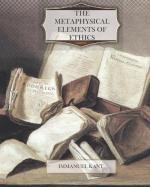{Introduction ^paragraph 25}
Remark
To virtue = + a is opposed as its logical contradictory (contradictorie oppositum) the negative lack of virtue (moral weakness) = o; but vice = a is its contrary (contrarie s. realiter oppositum); and it is not merely a needless question but an offensive one to ask whether great crimes do not perhaps demand more strength of mind than great virtues. For by strength of mind we understand the strength of purpose of a man, as a being endowed with freedom, and consequently so far as he is master of himself (in his senses) and therefore in a healthy condition of mind. But great crimes are paroxysms, the very sight of which makes the man of healthy mind shudder. The question would therefore be something like this: whether a man in a fit of madness can have more physical strength than if he is in his senses; and we may admit this without on that account ascribing to him more strength of mind, if by mind we understand the vital principle of man in the free use of his powers. For since those crimes have their ground merely in the power of the inclinations that weaken reason, which does not prove strength of mind, this question would be nearly the same as the question whether a man in a fit of illness can show more strength than in a healthy condition; and this may be directly denied, since the want of health, which consists in the proper balance of all the bodily forces of the man, is a weakness in the system of these forces, by which system alone we can estimate absolute health.
{Introduction ^paragraph 30}
III. Of the Reason for conceiving an End which is also a Duty
An end is an object of the free elective will, the idea of which determines this will to an action by which the object is produced. Accordingly every action has its end, and as no one can have an end without himself making the object of his elective will his end, hence to have some end of actions is an act of the freedom of the agent, not an affect of physical nature. Now, since this act which determines an end is a practical principle which commands not the means (therefore not conditionally) but the end itself (therefore unconditionally), hence it is a categorical imperative of pure practical reason and one, therefore, which combines a concept of duty with that of an end in general.
Now there must be such an end and a categorical imperative corresponding to it. For since there are free actions, there must also be ends to which as an object those actions are directed. Amongst these ends there must also be some which are at the same time (that is, by their very notion) duties. For if there were none such, then since no actions can be without an end, all ends which practical reason might have would be valid only as means to other ends, and a categorical imperative would be impossible; a supposition which destroys all moral philosophy.




